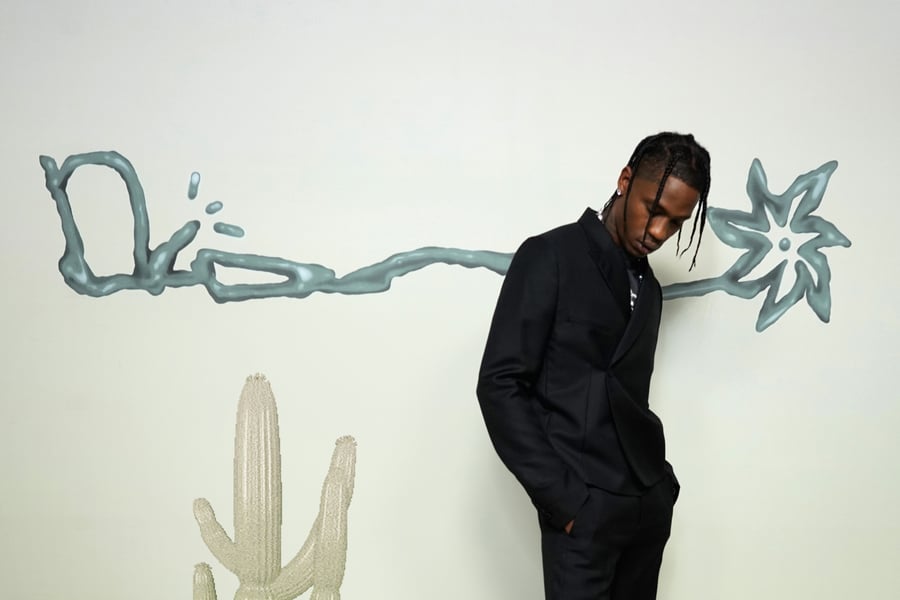When fashion giant Dior decided to make its entire upcoming spring/summer menswear collection a collaboration with Travis Scott, co-branded with his Cactus Jack label, the company thought it was entering into an invaluable partnership with a youth-culture titan. But in the wake of the fatal tragedy at Scott’s Astroworld festival, Dior is now facing an unprecedented business nightmare, experts said. “It is an apocalyptic marketing turn for that brand,” says Eric Schiffer, chairman of Reputation Management Consultants, “when you double down on this icon to Gen Z that now has effectively detonated in your face.”
“We’re very concerned,” says a Dior staffer who asked for anonymity. (A company spokesperson did not respond to a request for comment.) The Cactus Jack Dior line has almost certainly already been manufactured, experts said, and was likely set to be shipped to stores by early January. “In supply-chain terms, these goods have to be cut six months in advance,” says David Loranger, an assistant professor of fashion marketing and merchandising at Sacred Heart University, who had a long career in luxury retail. All of the promotional material is likely already completed as well, he added.
Luxury-retail expert Thomaï Serdari, who’s a professor of marketing at NYU Stern School of Business and founder of the brand-strategy firm BRAND(x)LUX, says she would advise Dior to take the hit and pull the entire season of product. “I think that could happen,” she says, noting she hasn’t seen the contract between Scott and Dior. “And I wouldn’t be surprised. This is about social responsibility and respect to the audience.”
Other companies face similar quandaries, but on a smaller scale: Nike, which has a long-standing and wildly successful partnership with Scott, has a new five-pair Air Max 1 collaboration with Scott on the way. “Nike has plenty of non-Scott-related product as well,” Loranger says. “They spread out their risks pretty well so they can always fall back on another person they have a collab with. They could shelve it or pump the brakes.” (Nike didn’t respond to a request for comment.)
Several experts agreed that Dior’s best option – short of pulling an entire, already made, heavily promoted season of product – may be to add a significant charity component to its line. The experts also advised Nike to put a hold on the new Air Max 1s, and if not, to announce their own charity donations. “If the line has already shipped,” said a music-marketing veteran who asked for anonymity, “and it’s too late to stop it, I’d make a significant contribution on every product sold that goes to [Astroworld] victims…. But do you really want to come out and promote a clothing line on Travis Scott in the next three months? You’re going to get [destroyed]. You’re going to get the letters from the Christian right. The media’s gonna be all over you. You’re gonna need crisis management, damage control.” Notably, Dior just began earlier-than-usual promotion of its pre-fall men’s collection, the season after the Cactus Jack Dior collaboration.
Dior does have an ongoing marketing partnership with another tarnished celebrity, Johnny Depp, and it never pulled its Sauvage cologne line in the face of domestic violence accusations, which he has denied. “They stuck with him,” Schiffer says, “which bodes for the fact that they’ll likely move forward.”
The Dior partnership is emblematic of a shift in the luxury industry, “from a quality-based industry to a completely branding-and-marketing-focused industry,” says Loranger. “And if you’re going to put all your eggs in that basket, then you should be prepared to own whatever comes out of that. If you take a collab partner and put their name all over a collection all over your brand, then that’s a huge risk that you’re taking as a brand. So in a risk-management sense, it’s almost not smart for brands to give collab partners too much of a footprint.”
Love Music?
Get your daily dose of everything happening in Australian/New Zealand music and globally.
Even McDonald’s partnered with Scott for a special meal last year, but the fallout from the Astroworld tragedy could scare off brands from edgy musicians in general. “Everybody wants to be in the music business, because it’s hip and cool,” says the music-marketing veteran. “But anybody could OD or get caught with their pants down, literally, at any given moment. That’s the business we work in. If you’re gonna put your toe in the water into the rock & roll music, hip-hop, whatever world, yeah, you might get burned.” On the other hand, Schiffer says, brands could see Astroworld as a one-time incident that’s unlikely to recur.
And Scott himself, regardless of what the facts turn out to be about his awareness of or culpability in the tragedy, will struggle to make any new brand partnerships for the foreseeable future, experts say. “New product endorsements? Not a chance,” says the music-marketing expert. Reputation Management Consultants’ Schiffer says Scott’s team would have to get creative in their choices. “You could see brands in which they don’t care about the negative implications,” he says. “So for instance, crypto-coin offerings or something.”
From Rolling Stone US



































